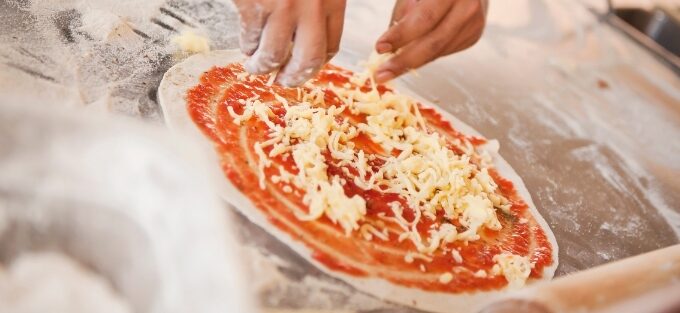Introduction
Pizza might look simple from the outside flour, sauce, cheese, and a hot oven. But for foodpreneurs like you, mastering artisan pizza skills opens a world of creativity, brand-building, and scalable business opportunities. In today’s saturated food industry, quality and authenticity stand out more than ever. Artisan pizza delivers both.
In this article, you’ll learn how taking an artisan pizza course or earning a pizza making diploma can give you a major competitive edge. You’ll discover how artisan techniques elevate your brand, reduce startup risk, and help you successfully start a pizza business that thrives in any economy.
The Artisan Pizza Movement: More Than Just a Trend
People around the world are shifting away from fast food toward high-quality, hand-crafted meals. Artisan pizza has emerged as a leader in this movement not just because it’s delicious, but because it represents authenticity, tradition, and skill.
Artisan pizza emphasizes long-fermented dough, high hydration, carefully sourced ingredients, and wood-fired or stone deck oven techniques. Each pizza becomes a signature piece of edible art. As a foodpreneur, this trend is your opportunity to tap into a rising demand for honest, chef-driven experiences.
Consumers are no longer satisfied with generic pies. They want flavor, texture, aroma, and origin stories. They want to know who made their food and how. That’s where your artisan pizza skills shine.
Why Foodpreneurs Like You Need Pizza Making Skills
To compete today, you need more than passion. You need technique, speed, efficiency, and consistency. A pizza making diploma equips you with exactly that. Instead of guessing, you’ll understand what makes great pizza great and how to reproduce it perfectly.
You’ll gain a deep understanding of fermentation, dough hydration, baking science, topping balance, and heat control. These skills don’t just make better pizzas they make better businesses.
When your product quality is reliable, you build customer trust. And with artisan methods, you’ll also have the flexibility to create new recipes, adapt to trends, and keep your brand fresh.
Dough Mastery: Where All Artisan Pizza Begins
Every artisan pizza starts with the dough. It’s more than flour and water—it’s living chemistry. As a foodpreneur, you need to understand hydration percentages, gluten development, fermentation timelines, and proofing environments.
For example, a 65% hydration dough with a 48-hour cold ferment offers a crispy outer crust and airy interior crumb. Using the wrong flour or rushing the process leads to flat, dense results. An artisan pizza course teaches you how to adjust these variables based on your equipment, environment, and menu.
You’ll learn how to work with sourdough starters, biga, poolish, and direct dough methods. These skills help you offer distinct crust profiles that become your signature.
Oven Skills: Turning Dough into Gold
The oven is your final tool and often your biggest challenge. Artisan pizza requires high-heat ovens, usually ranging from 600°F to 900°F. Different styles of pizza (Neapolitan, Roman, New York, Detroit) require different baking surfaces, timing, and fuel sources.
Training teaches you how to handle wood-fired ovens, gas burners, electric decks, and convection models. You’ll learn how to rotate pies, monitor bottom browning, blister crusts, and achieve the right leopard spotting.
Without this knowledge, you risk inconsistent bakes and wasted product. With it, every pizza becomes a perfectly cooked masterpiece.
Creativity and Signature Recipes: Your Unique Selling Point
Once you understand the dough and oven, you can get creative with toppings, sauces, and finishes. Artisan pizza doesn’t follow a fixed rulebook. You can use roasted vegetables, aged cheeses, smoked meats, truffle oils, or vegan alternatives.
This is where your artisan pizza course shines helping you discover how to build balanced flavor profiles. You’ll experiment with salt, fat, acid, and texture to create pies that people talk about.
Signature recipes build brand identity. They make your shop memorable. When someone says, “You have to try their fig and goat cheese pizza,” you’ve succeeded.
Starting a Pizza Business: What Sets You Apart
Starting a food business is risky. But when you start a pizza business with artisan skills, you lower the risk by offering a premium, differentiated product. Artisan pizza is perceived as higher value and customers are willing to pay more for quality.
You don’t need a massive kitchen or a full menu. Many successful pizza shops start with a single oven, a few proven recipes, and a commitment to quality. With low startup costs and high returns, artisan pizza is a smart first venture.
You also avoid price wars. Fast-food chains compete on cost. Artisan pizza competes on quality, story, and experience. That’s a better place to be.
Business Skills from a Pizza Making Diploma
A solid pizza making diploma includes more than recipes. It teaches essential operational and business skills that directly support your growth.
You’ll learn:
- How to plan kitchen workflows for maximum efficiency
- How to portion dough and toppings for consistency and cost control
- How to calculate your food cost and set profitable menu prices
- How to source premium ingredients without breaking your budget
- How to scale your recipes for volume production
- How to maintain hygiene and meet food safety standards
These aren’t just nice to know—they’re make-or-break for your pizza business.
Creating a Brand That Customers Trust
Consumers connect with story-driven brands. Artisan pizza naturally offers that narrative heritage, technique, quality, and heart. But your artisan pizza course will also teach you how to communicate it effectively.
Whether you name your brand after your grandmother, your hometown, or a specific pizza style, your brand must feel genuine. Through packaging, menu language, social media, and community presence, your pizza should reflect your passion and professionalism.
And it’s not just about look and feel. When your brand delivers what it promises flavor, consistency, care customers become loyal advocates.
Exploring Business Models That Fit Your Vision
Artisan pizza fits many business models. You don’t have to commit to a full-scale restaurant on day one.
Here are several successful formats you can explore:
- Food truck or mobile oven
- Ghost kitchen with delivery-only model
- Small dine-in shop with a limited, curated menu
- Pop-up stalls at farmers markets and events
- Pizza subscription or frozen artisan pizza line
Your training gives you the flexibility to adapt your business to your budget, lifestyle, and market demand.
Online or In-Person Training: Which Is Right for You?
You can gain artisan pizza skills through either online or in-person programs. Each has pros and cons.
Online courses give you flexibility. You can learn at your pace, review lessons, and practice from your kitchen. Look for programs with video demonstrations, downloadable materials, and student support groups.
In-person classes offer direct chef feedback, commercial kitchen exposure, and peer interaction. These are ideal if you want immersive, fast-paced learning.
Whichever path you choose, make sure the program covers technical training and business fundamentals. That’s what makes your skills market-ready.
Scaling Your Pizza Business Without Compromising Quality
One of the biggest fears when growing a food business is losing quality. But artisan pizza is highly scalable if you build the right systems.
Your training prepares you for scale by teaching you how to standardize dough fermentation schedules, ingredient sourcing, and bake times. With documented processes and trained staff, you can open multiple locations or license your brand without sacrificing quality.
Some foodpreneurs even franchise their concept or offer masterclasses to generate extra revenue. Artisan pizza becomes not just your product, but your platform.
How Others Turned Artisan Skills into Success
You’re not the first to dream of building a business around artisan pizza. And many have succeeded before you. From tiny Neapolitan pop-ups to multi-unit fast-casual chains, skilled pizza makers are carving their own path.
Some opened cozy corner shops. Others built strong delivery businesses. Many leveraged their Instagram presence to go viral with photogenic pies. And a few went international—bringing their style of artisan pizza to new markets.
What they all had in common was skill, training, and commitment to doing pizza right.
Steps to Get Started Today
If you’re ready to take the leap, here’s your action plan:
- Research pizza making diplomas and artisan pizza courses that match your learning style.
- Read reviews, check alumni testimonials, and ensure the curriculum includes business training.
- Enroll and commit to the process take notes, practice often, and ask questions.
- Start experimenting at home, then share your pizza with family, friends, or a small audience.
- Test different business formats, from catering to delivery-only. Choose what fits your lifestyle.
- Create a simple business plan, including menu, pricing, marketing, and equipment needs.
- Launch with clarity and confidence, knowing your skills are your foundation.
Why Now Is the Best Time to Start a Pizza Business
Consumer demand for quality, transparency, and experience is growing. Pizza remains one of the most beloved foods worldwide but only a small portion of the market offers true artisan quality.
That’s your window.
Whether it’s the sourdough crust, the wood-fired char, or the story behind your tomato sauce, artisan pizza gives you a powerful way to connect with people. In a noisy market, that connection is your biggest asset.
If you’ve ever thought about turning your love of pizza into a business, now is the time. The skills are accessible. The audience is hungry. And the opportunity is real.
Conclusion
Artisan pizza skills aren’t just about better dough they’re about building a better business. With the right pizza making diploma or artisan pizza course, you’ll gain technical excellence, creative freedom, and business clarity.
These skills empower you to start a pizza business that’s profitable, scalable, and full of passion. Whether you dream of a single oven shop or a regional chain, artisan training gives you the tools to make it happen.
So go ahead get trained, get creative, and get baking. Your foodpreneur journey starts here, one perfect pizza at a time.



